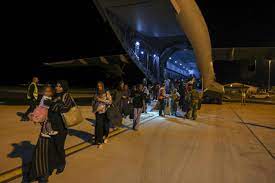
The UK is pushing for an extension to a ceasefire in Sudan in an effort to buy more time to get as many British nationals away from the conflict that has erupted in the war-torn country over the past few weeks.
The Sudanese armed forces and the paramilitary Rapid Support Forces (RSF), have been locked in a fierce battle for control but leaders agreed to a 72-hour truce, although this was undermined yesterday (26 April) when fighting flared in the outskirts of the capital, Khartoum, emphasising the need for foreign citizens to evacuate immediately, if able to and make their way to an extraction site.
Emergency talks held to try and extend ceasefire
There has already been a 24-hour extension, but the situation is incredibly fragile. The army’s General Abdel Fattah al-Burhan, gave his initial approval to the plan, but no response has come back from their bitter rivals’ General Mohamed Hamdan Dagalo, commonly known as Hemedti, which leaves an air of uncertainty and making the entire region incredibly dangerous.
There are reports that an army envoy has been sent to neighbouring South Sudan’s capital, Juba, to conduct emergency talks with representatives from the Intergovernmental Authority on Development (IGAD), who are a regional bloc, which also includes Kenya and Djibouti.
Plea for UK nationals to get out whilst they can
Foreign Secretary, James Cleverly said: “We pushed for the original ceasefire, and we are pushing for an extension with our international partners and leaders in the region, and hopefully to have a permanent peace settlement.”
However, he stated that neither of those things could in any way be guaranteed, so he underlined his concern that whilst he understood making the decision to leave was probably a difficult one, he could not predict what would happen once the ceasefire lifts and intense fighting resumes, pointing out that it may not be possible to continue the evacuation process.
He urged British nationals who may be “weighing up their options” to make their way to Wadi Seidna, where there were “planes and capacity” to get them out, “before it is too late.”
British diplomats flown to safety
Some of the first people rescued were 24 British diplomats and their families. Elite soldiers from the SAS and the Parachute regiment were thought to have been scrambled to RAF Akrotiri in Cyprus, after government ministers were taken by surprise at the sudden rebellion and subsequent outbreak of ferocious fighting.
They guarded the frightened officials before taking them to the Wadi Seidna airbase 14 miles north of Khartoum, where two transport planes, an A400M Atlas and a C-130 Hercules (the latter part of a fleet due to be retired from the end of June) landed and took off rapidly to bring the diplomats to safety.
The evacuation party did not include Giles Lever, the UK’s ambassador to Sudan, as he had previously taken a holiday and so was not in the country when the crisis emerged.
Race against time
Initially, British and dual nationals trapped in Sudan had been told to “stay indoors” for their own safety. It had been thought there were only a few hundred in the country, but the true number is believed to be nearer four thousand.
Once the ceasefire was agreed, a mission was put in place to bring as many out as possible during the “calm” window of opportunity. As at 9pm on 26 April, The Foreign, Commonwealth and Development Office (FCDO), reported that 536 individuals had been brought to safety on six separate flights, with more to come in what was described as “a race against time” in a “fast-moving situation”.
Military vow to continue with evacuation
Brigadier Dan Reeve, Britain’s chief of joint force operations, said that up to 500 people a day can be flown out of Wadi Saeedna, with transport planes available to increase that number if necessary.
He tried to reassure worried families that even if the ceasefire breaks, as it is expected to do, the evacuations can continue. “The ceasefire itself was not a condition for us launching this operation, although of course it helped and was a useful window,” he said.
What has caused conflict?
The fighting erupted after weeks of simmering tension, with powerful rival military factions battling for control, increasing the risk of a nationwide civil war. Previously, both warring groups were actually allies and together, they seized power in a 2021 coup, upending a fragile transition to civilian rule that had been started after the 2019 removal of long time ruler, Omar al-Bashir.
Al-Burhan, who rose through the ranks assumed the top job as the de facto ruler of Sudan after the coup, with Dagalo, from Darfur’s camel-herding Arab Rizeigat people, taking on the responsibility as his number two.
However, integrating the RSF into the regular army became an increasingly difficult matter to solve, culminating in the inevitable conflict which saw hundreds killed and thousands injured in just the first few days of violent clashes across the country.













0 Comments